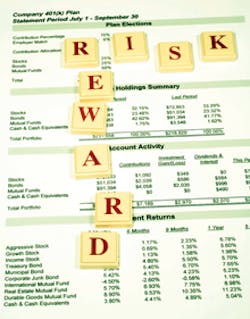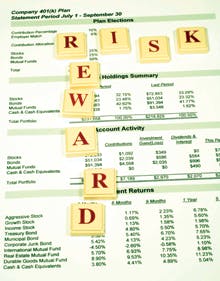How to get out alive, Part 3
by Rick Willeford, MBA, CPA, CFP
If you followed the principles of the first two articles in this series, you should be generating funds for saving and investing. The next question is usually where to invest in the stock market. For those of you who have already done some investing, this seems like an especially pertinent question because you are probably frustrated because you can’t consistently “beat the market.” You thought if you worked as hard as you did in dental school, doing extra cases and staying up late, you would gravitate toward the top of the class. After all, that’s the American Way. So why doesn’t that work with investing? (Read on ... it turns out you may be trying to win in a loser’s game.)
Rather than ask “where” to invest, you should first determine “how” to invest. Let me explain. Whether you are a frustrated investor or simply have no interest in such things, you may subconsciously agree with the 95 percent of folks who think there are three places in the world where the stock market doesn’t work: North Korea, Cuba, and Wall Street. What? I’m getting ahead of myself. Time for an example.
What if you could bet on a football game between Ohio State and your local high school? You don’t have to be the head cashier at Wal-Mart to know the obvious bet is on Ohio State. Enter odds makers like Jimmy the Greek. Would you bet on the high school team if you got an extra 50 or 100 points? There is some point spread that would make it an even bet. It could be that the consensus among all the professional odds makers is 237 points. The actual outcome won’t be exactly that number, but it is amazing how the spread works out. I’ll bet you don’t know anybody who consistently wins enough football bets to make a living at it, especially after the cost of playing and losing some.
The stock market works in a similar way. If Home Depot is selling for $35 per share, that means tens of thousands of professional money managers and analysts have decided that is the right price, based on all available information. If you or an advisor you work with think it should be $50, then you are saying a lot of very smart people are wrong, which means that you are saying the markets don’t work.
You or your advisor may think that all the new Internet tools and the flow of information will give you a leg up as you actively try to beat the market. Remember, 80-plus percent of all trades are done by professionals at institutions. They all have the same information. All this information is said to make the markets efficient. Unless you have illegal access to insider information, the Efficient Market Hypothesis says that any information about a company (strengths, weaknesses, future prospects, etc.) is already reflected in the current price. For instance, the fact that the population is aging is not a secret, and it has already been factored into the price of health-care stocks. In fact, studies show that significant changes in company information are reflected in its stock price in less than 40 seconds!
You may acknowledge that most folks can’t beat the market, but you or your advisor’s egos may make you think that you are special and that you can make active investing work. (It’s like Lake Wobegon, where all the kids are above average.) We would all like to find a Tiger Woods of investing, but there are 20,000 Tigers out there, so you can’t know which Tiger will win at any given time.
Some advisors give up managing directly, and try to outsource the problem by becoming a “manager of managers.” This doesn’t overcome the Efficient Market Hypothesis; in fact, it may just add a fruitless layer of additional fees! For example, there is a study of manager performance for the 230 plus largest pension funds. They can afford to hire the best investment managers, the likes of which you and I will never have access to. Yet, with all their horsepower, 93 percent of the time these managers fail to beat a passive basket of “index” funds made up of 60 percent stocks and 40 percent bonds (a typical allocation for large pension funds). Nor was it the same managers in the 7 percent each year!
An “index” fund blindly buys every stock in a defined index, such as the S&P 500. The objective is to happily accept a return about equal to the overall market, or at least that index. This is the opposite of active investing. Part of the benefit is to keep expenses low, since there is not a lot paid for research, trading, etc.
The granddaddy of index funds is the Vanguard S&P 500 Index Fund. If you do your own investing, then you have access to this fund and others. However, indexing is only one form of passive investing. Some would say that blindly indexing is like “checking your brains at the door.” For a very simple example, suppose company No. 500 in the S&P 500 list dropped to No. 501.
Theoretically, to precisely match the index, the index fund would be obligated to sell that company and replace it with the new company. If the prior company became No. 500 again in a few months, the index fund would have to buy it back. Why not have a simple rule in place that states that a company has to fall outside the index for, say, six months before you sell it?
This would minimize the whipsaw effect. The more rules and filters a fund uses, the less it is like a pure index fund. However, the underlying fund philosophy is still passive. There are institutional funds, like those of Dimensional Fund Advisors, who use this approach and often outperform pure index funds.
Deciding between the active vs. passive approach is just the first decision. Next you must decide your risk and reward profile. You can’t tell an advisor you want a 15 percent return, but no risk. You must choose whether you want to sleep well now or eat well later. Fact is, you have to balance short-term risk with long-term risk.
Statisticians and financial folks think of short-term based on the standard deviation of volatility, i.e., what is the risk that your account will be down next Monday? Long-term risk is more insidious and asks the question about whether you will have enough money when you retire. One of an advisor’s main challenges is to help you make an informed decision to balance those two risks.
Once you establish that profile (often called an Investment Policy Statement), that gives the advisor the direction needed to manage your funds. The next big challenge is to help you stay the course as the inevitable ups and downs occur. (We find that everybody is a long-range investor - as long as the market is going up!)
We facetiously say that we don’t have doctors with investment problems - we have investments with doctor problems! You need to get out of your own way many times. For instance, we talk about the stock market averaging about 10 percent over time.
Yet, the average investor realizes less than one half of that return on his or her own account. This is due to excessive trading or not being fully invested because he or she is trying to time the market or is off chasing the latest hot stock tip. It is imperative that you receive a quarterly performance report if you use a professional advisor. This is not the same as your monthly report from Schwab, Fidelity, etc. Rather, a performance report shows you a cumulative history - or returns - for one, three and five years.
So, don’t get caught playing the loser’s game. It is the performance of your overall portfolio that counts, not just a few hot winners. Those are for bragging rights at the study club.Raymond “Rick” Willeford, MBA, CPA, CFP®, is president of Willeford Haile, CPA, PC, and WillefordCPA Wealth Advisors, LLC. As a fee-only advisor, he has specialized in providing financial, tax, and transition strategies for dentists since 1975. Willeford is the president of the Academy of Dental CPAs, a consultant member of AADPA, and is available as a speaker nationwide. Contact him by phone at (770) 552-8500 or by e-mail at [email protected].

